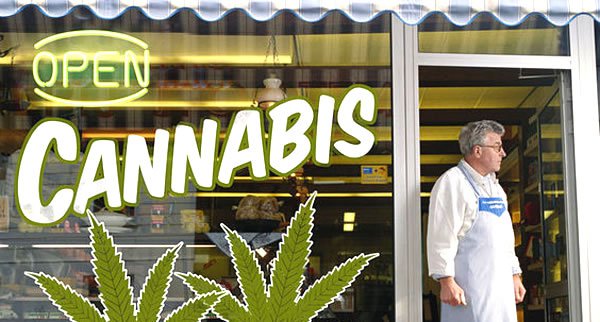Social Use for Marijuana Evolving in Legal States

By Chris Goldstein
It isn’t easy being green. State-legal cannabis is now a multi billion dollar industry in the United States. Yet adult consumers still can’t enjoy a joint as casually as a beer.

Inside the world famous Cannabis Cafe in Portland, OR.
Everyone knows that marijuana is legal in Colorado. But smoking in public is still technically against the law. Restaurants, bars, sports stadiums and other venues continue to officially ban puffing on a spliff.
Adults can buy a wonderful array of dried flowers, hash oils, concentrates, edibles, infused drinks and even trans-dermal patches. The only place allowed to consume is within a home.
This policy has left locals and especially tourists confused and unhappy.
There are a few private clubs open around the Centennial State. But Denver police raided two clubs on 4/20 weekend in 2015 and a federal raid of the Lazy Lion Club in Colorado Springs took place in late January.
Last year the Marijuana Policy Project (MPP) was moving towards offering a ballot initiative to allow social use in Denver. It would likely be a sure thing for the city that voted to decriminalize marijuana possession 2005, made pot the lowest law enforcement priority in 2007 and heavily favored full legalization in 2012.
MPP had gathered more than enough petition signatures to put the issue up for a vote. Some business organizations and the city government expressed concern that a voter approved measure would leave them on the sidelines and begged the group to wait. MPP agreed to put their campaign on hold. The advocates agreed to enter negotiations with the Denver City Attorney, The Colorado Hotel Association and the Colorado Restaurant Association. But, according to Westword, little progress has been made. MPP says they are ready to go to voters if the talks fail to produce results.
Mayor Michael Hancock had explicitly banned cannabis clubs in 2013. Hancock indicated during a meeting with the Denver Post’s Editorial Board that he is rethinking that position.
DenverNORML isn’t waiting. After the mayor’s comments the group started gathering signatures for a ballot measure of their own. It could be decided in the November general election.
The Washington DC City Council also shifted their stance on social use this week. Almost 70 percent of voters passed a measure to legalize cannabis for adults there in 2014. Unlike the four states that offer a retail sales system, DC residents can only grow their own. Cultivating 6 plants, possessing two ounces and giving one ounce away is allowed. That system has been a quiet success in the nation’s capitol.
DC Mayor Muriel Bowser and the city council weathered a showdown with the US Congress, who control the city’s budget, when they went forward with implementing the legalization law.
There was a temporary ban on cannabis clubs that was set to expire. The council was about to make the ban permanent. After an organized response from advocates, namely activist Adam Eidinger and DCMJ, the council reconsidered. The city council has instead set up a task force this week to explore the issue.
Portland, Oregon is home to the World Famous Cannabis Cafe. The lounge was opened to card carrying medical marijuana patients in 2009 by Madeline Martinez, the director of Oregon NORML and a board member at National NORML. Last year the space opened to anyone 21 or older as Oregon went fully legal. Marijuana is not sold there but patrons bring their own in a BYOCannabis environment. The space offers snacks, games, live music and other entertainment.
Last year the Oregon Indoor Clean Air Act was passed and went into effect on January 1, 2016. There are exemptions in the law for tobacco shops and cigar lounges but the law was expanded to include cannabis and e-cigarettes.
Martinez has argued that the law should also allow cannabis clubs an exemption to operate. So far the World Famous Cannabis Cafe remains open for business. But they could face civil fines of up to $4,000 per month.
Alaska is expected to start licensing cannabis businesses later this month. Possession and home cultivation are already legal. Private clubs to consume cannabis have already sprung up in Anchorage, Fairbanks and other cities. The state’s new Marijuana Control Board said they could not create any specific provisions for the establishments. Instead they voted to allow on-site consumption at licensed retail establishments.
What remains unclear is if smoking or vaporizing cannabis will be allowed under those rules in Alaska. There are still indoor smoking bans in place.
One concept for a cannabis club wasn’t waiting for state laws to change. The Flandreau Santee Sioux Tribe in South Dakota had plans last year to open a marijuana bar in a former bowling alley. They were the first Native American in the nation to legalize marijuana in a vote of the Tribal Council. The plan was to sell cannabis one gram at a time for consumption on site. They built a state of the art growing facility, seed-to-sale tracking system and had already started to cultivate plants.
Then the SD Attorney General said that non-tribal citizens would be prosecuted for utilizing the service. After further consultation with federal government officials the tribe decided to suspend operations and then burned their entire crop.
Americans certainly deserve the ability to enjoy cannabis together not just sitting alone in the privacy of their homes. This aspect of ending prohibition should not be overlooked in future legalization laws.


